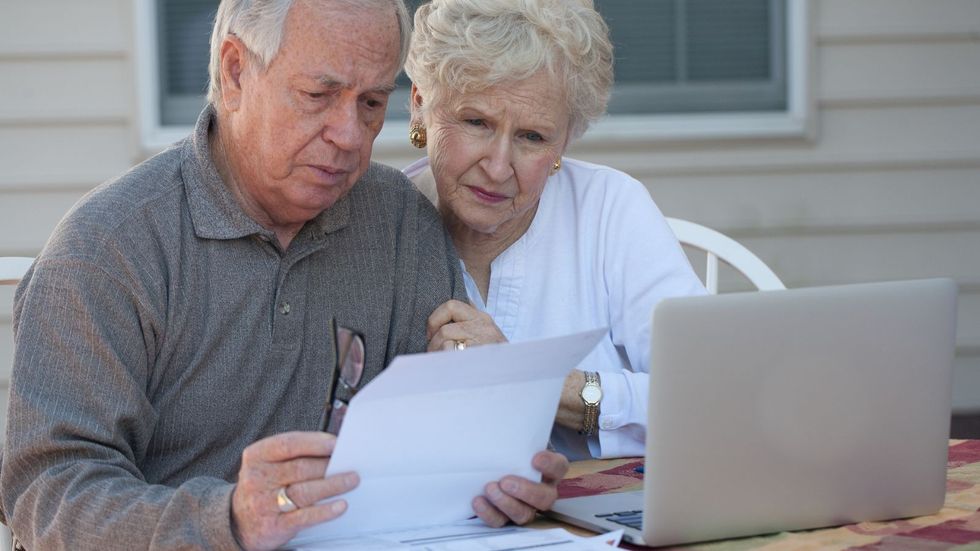State pension payments to hit £12,600 annually next year BUT pensioners face 'back door tax' for first time
Britons react to state pension triple lock being under threat
Thanks to the triple lock, state pension payment rates rise every year but Britons could be at risk of paying more tax
Don't Miss
Most Read
Trending on GB News
State pension payment rates could increase above £12,600 next year thanks to the triple lock, but this may push millions of pensioners into paying more tax for the first time.
Analysts are sounding the alarm that the new pension payments from the Department for Work and Pensions (DWP) may reach £12,631 in April 2026, breaching the tax-free personal allowance threshold of £12,570.
This historic development means some pensioners will need to hand money from their back to the taxman from their state pension alone unless action is taken by policymakers.
The increase stems from continued wage growth originating from the triple lock, with payments rates increasing by either the rate of inflation, average wages or 2.5 per cent; whichever is highest.
Deutsche Bank's analysis suggests that the state pension could increase from £11,973 to £12,631 in April 2026, representing a 5.5 per cent rise.
Do you have a money story you’d like to share? Get in touch by emailing money@gbnews.uk.

The state pension is set to rise but this could increase claimants' tax liability
GETTY
This would mark the first time the state pension has exceeded the personal allowance of £12,570, at which point income tax becomes payable. Currently, the personal allowance threshold remains frozen until April 2028, as part of the Government's continued policy on tax thresholds.
Capital Economics offers a slightly lower forecast, projecting a 5.1 per cent increase that would take the annual state pension to £12,583. The impact of this increase could see around 450,000 people paying income tax on their state pension alone.
A basic rate taxpayer receiving only the full new state pension would face an annual tax bill of just over £12. Former pensions minister Sir Steve Webb said HMRC would likely find such small amounts not cost-effective to collect initially.
However, he warned that as the pension continues to rise in future years, these pensioners would eventually start receiving tax demands. Currently, pensioners only pay tax if their overall income - including state pension and other sources - exceeds £12,570.
Under the triple lock, state pensions increase each April by the highest of average wage growth, inflation, or 2.5 per cent. Recent figures released yesterday show wage growth, excluding bonuses, reached 5.9 per cent in the October to December period.
This represents an acceleration from 5.6 per cent in the three months to November. The current wage growth significantly outpaces the UK's inflation rate of 2.5 per cent.
Dr Dimitrios Syrrakos of Keele University noted this nearly six per cent wage growth is "a lot higher" than the Office for Budget Responsibility's (OBR) estimate of 4.2 per cent.
Deutsche Bank's chief UK economist Sanjay Raja told The i Paper: "As of right now, our projection for average weekly earnings total pay in the three months to July sits at 5.5 per cent year-on-year."
"Our September 2025 CPI inflation projection sits just around 4.25 per cent. Therefore, based on our current projections we see state pensions rising by 5.5 per cent in April 2026."
Former pensions minister Baroness Ros Altmann cautioned that nothing is certain, noting: "Especially after the rise in employer NICs and the trend of increased layoffs seen more recently. Forecasts can only be as good as their assumptions, and these are not written in stone."
LATEST DEVELOPMENTS:
 Pensioners are worried about the cost of living GETTY
Pensioners are worried about the cost of living GETTY From April 2024, retirees on the full new state pension will receive £230.25 weekly, or £11,973 annually. Those who reached state pension age before April 2016 will get the basic state pension of £176.45 weekly, or £9,175 yearly.
The Labour Government has not committed to raising income tax thresholds for pensioners or other taxpayers.
Chancellor Rachel Reeves has stated she won't introduce additional tax rises but hasn't ruled out maintaining frozen tax thresholds.
Tax consultant Tom Minnikin notes that freezing tax thresholds is "a tax rise through the back door," with thresholds set to remain frozen until April 2028.








